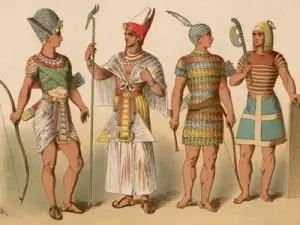The type of government in ancient Egypt was a theocracy. The pharaoh was the head of ancient Egyptian government officials. People believed him to be a living god. This status basically granted the pharaoh (who was, in almost all cases, a man) virtually limitless power and control over his subjects. This gave him absolute control over the affairs of the Empire and its people.
The Egyptian Government used the power of religion as a control in ruling the country.The Pharaoh was the person who established the laws. The Pharaoh is like the king of Egypt. He controls its people, population, government, economy and almost everything else. His Vizier is second in command and controls everything the Pharaoh cannot. The vizier was equivalent to a Prime Minister.

He is always by the Pharaohs side. Together, as things need improvement or need to be solved, they will judge if a law should be enforced or not. If so, it will be reported to the community. So, the Pharaoh establishes the laws and the Vizier helps him.
The Vizier was also the judge of the high court. If you had a problem and it was not solved in the local courts, or in the provincial courts, you could bring your problem in front of the Vizier on a first come, first served basis. It was dangerous.
The Vizier’s decision was final. You could end up in more trouble than you started with. But the Vizier tried to be fair. He had to explain aloud the reason for his decision in each case so that everyone who came to court that day could hear those reasons.
Egyptian Government Structure
The government structure of ancient Egypt involved other officials, including viziers, army commanders, chief treasurers, minister of public works, and tax collectors, all of whom answered directly to the pharaoh. There were also governors of specific pieces of land who answered to the vizier.
Security of life and property and the continuity of law and Egyptian government rested almost entirely on the prestige of the Pharaoh, maintained by the schools and the church. No other nation except China has ever dared to depend so largely upon psychological discipline. It was a well-organized government, with a better record of duration than any other in history.
The majority of Egyptian people were peasants who worked the land along the fertile Nile flood basin. These people had no voice in their Egyptian Government and accepted this fact because it was backed by their religion. This mingling of religion and government is probably what kept Egypt so powerful and centralized during its high points.